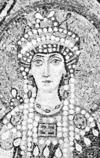- Theodora
-
/thee'euh dawr"euh, -dohr"euh/, n.1. A.D. 508-548, Byzantine empress: consort of Justinian I.2. a female given name: derived from Theodore.
* * *
born с 497died June 28, 548, ConstantinopleByzantine empress, wife of Justinian I.The daughter of a bear keeper at the Hippodrome in Constantinople, she became an actress and the mistress of Justinian. He married her in 525, and when he became emperor in 527 she was proclaimed empress. Probably the most powerful woman in Byzantine history, she was her husband's most trusted adviser, sponsoring legal reforms and wielding great influence in diplomacy, military appointments, and internal politics. Her impassioned speech gave Justinian the strength to order the brutal suppression of the Nika revolt (532) and save his empire. She recognized the rights of women and ended persecution of Monophysite Christians, with whom she sympathized. Theodora, detail of a Byzantine mosaic in the Church of San Vitale, Ravenna, Italy.Andre Held-J.P. Ziolo
Theodora, detail of a Byzantine mosaic in the Church of San Vitale, Ravenna, Italy.Andre Held-J.P. Ziolo* * *
▪ Byzantine empress [981-1056]born 981?, Constantinople [now Istanbul, Tur.]died Aug. 31, 1056, ConstantinopleByzantine empress who reigned jointly with her sister Zoe in 1042 and on her own in 1055–56.The third daughter of the emperor Constantine VIII, Theodora possessed a strong and austere character and refused the hand of the heir presumptive, Romanus, who was married instead to her sister Zoe (1028). Though living in retirement, she excited Zoe's jealousy and, accused of complicity in a conspiracy, was confined in a monastery. In 1042 the popular movement that caused the dethronement of Michael V also led to Theodora's installment as joint empress with her sister. After two months of active participation in government she allowed herself to be virtually superseded by Zoe's new husband, Constantine IX (Constantine IX Monomachus). Upon his death in 1055, in spite of her 70 years, she reasserted her dormant rights with vigour and frustrated an attempt to supersede her on behalf of the general Nicephorus Bryennius. By her firm administration she controlled the unruly nobles and checked numerous abuses; but she marred her reputation by excessive severity toward private enemies. She also angered the patriarch Michael I Cerularius (Michael Cerularius) by appointing clerics, which was held to be inappropriate for a woman. She approved the succession of Michael VI as emperor on her deathbed.▪ Byzantine empress [died 548]born c. 497 CEdied June 28, 548, Constantinople [now Istanbul, Turkey]Byzantine empress, wife of the emperor Justinian I (reigned 527–565), probably the most powerful woman in Byzantine history. Her intelligence and political acumen made her Justinian's most trusted adviser and enabled her to use the power and influence of her office to promote religious and social policies that favoured her interests.Little is known of Theodora's early life, but a combination of the official version with that found in the highly coloured Secret History of Procopius of Caesarea probably provides the best explanation. Her father was a bear keeper at the Hippodrome (circus) in Constantinople. She became an actress while still young, leading an unconventional life that included giving birth to at least one child out of wedlock. For a time, she made her living as a wool spinner. When Justinian met her, she had been converted to monophysitism (monophysite), a non-orthodox doctrine. Attracted by her beauty and intelligence, he made her his mistress, raised her to the rank of patrician, and in 525 married her. When Justinian succeeded to the throne in 527, she was proclaimed augusta.Theodora exercised considerable influence, and though she was never coregent, her superior intelligence and deft handling of political affairs caused many to think that it was she, rather than Justinian, who ruled Byzantium. Her name is mentioned in nearly all the laws passed during that period. She received foreign envoys and corresponded with foreign rulers, functions usually reserved for the emperor. Her influence in political affairs was decisive, as illustrated in the Nika revolt of January 532. The two political factions in Constantinople, the Blues and the Greens, united in their opposition to the government and set up a rival emperor. Justinian's advisers urged him to flee, but Theodora advised him to stay and save his empire, whereupon Justinian's general, Belisarius, herded the rioters into the Hippodrome and cut them to pieces.Theodora is remembered as one of the first rulers to recognize the rights of women, passing strict laws to prohibit the traffic in young girls and altering the divorce laws to give greater benefits to women. She spent much of her reign trying to mitigate the laws against the monophysites. Though she succeeded in ending their persecution in 533, she never succeeded in changing Justinian's religious policy from its emphasis on orthodoxy and friendship with Rome.The best-known representation of Theodora is the mosaic portrait in the Church of San Vitale in Ravenna. Her death, possibly from cancer or gangrene, was a severe blow to Justinian. Her importance in Byzantine political life is shown by the fact that little significant legislation dates from the period between her death and that of Justinian (565).* * *
Universalium. 2010.
